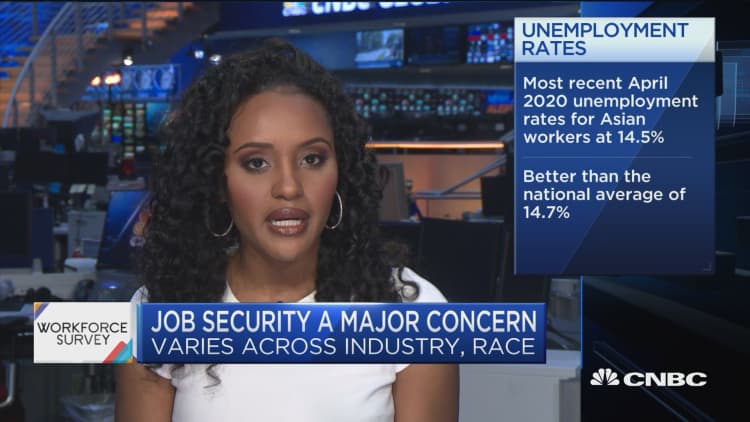Last week, after months working from home to help flatten the curve of the coronavirus outbreak, Twitter announced that its employees will be allowed to continue to work remotely — permanently.
Technology companies have made working from home not just possible, but some now argue just as productive as the traditional office. Microsoft gave us email, Slack brought instant messaging to the enterprise, and Zoom Video Communications video conferencing, but Silicon Valley as a whole has been at the forefront of flexible work arrangements.
As the coronavirus outbreak spurred nationwide safety orders, many businesses sent their workers home. In the latest CNBC|SurveyMonkey Workforce Survey, about half of all people in the workforce (48%) indicate they've been able to do their jobs remotely in recent weeks. In the survey, remote workers report higher levels of job satisfaction than those still going into the office. Many workers say they want to keep working from their improvised kitchen table offices, with their spouses, children, and dogs as their new coworkers.
Silicon Valley salary reset
Technology workers have always been a bit spoiled when it comes to working from home. In a Wall Street Journal|SurveyMonkey poll conducted in early March, prior to the announcement of any mandatory shelter-in-place orders or large-scale work-from home policies, 62% of workers in the technology industry called it "very possible" for them to work from home — easily the highest of any industry.
In the new CNBC|SurveyMonkey results, 83% of tech workers say they've been able to work from home in recent weeks, and many want their new routines to stick. More than a quarter (27%) say they'll want to work from home all the time from now on, and 36% say they'll want to work from home more often than they used to. Just 5% say they'll want to work from home less often than they had previously, and a mere 2% never want to work from home again.
The survey polled a national sample of 9,059 workers in the United States and was conducted May 4–10, 2020.
To use the parlance of the tech industry itself, increased remote work makes their labor market ripe for disruption.
If those numbers play out, the job market for technology workers could look much different than it did before the pandemic. Tech workers are highly paid: 44% of tech workers reported incomes in the six figures — again, easily the highest of any industry. With more companies allowing their employees to work from anywhere, that also allows them to hire from anywhere — vastly increasing the pool of available job candidates, a theme Linked In CEO Jeff Weiner hits regularly: "Equal talent deserves equal access to opportunity."
That means competition for jobs at places like Facebook and Twitter will increase, with potential to set off a chain of events — a brain drain from other industries, a consolidation of talent at a few top tech companies, a decrease in average salaries, a dispersal of the Silicon Valley labor force — that will have wide-ranging effects.
To use the parlance of the tech industry itself, increased remote work makes their labor market ripe for disruption.

Out of habit, inertia, or just a plain fear of change, many white-collar workplaces have avoided allowing employees to regularly work from home — but that may soon change. Plenty of so-called knowledge workers are finding that they can comfortably do their job from just about anywhere they have a wifi connection and their laptop.
Large majorities of workers in the consulting & research (85%), insurance (84%), advertising and marketing (73%), finance and financial services (70%), legal (68%) industries have been doing their jobs remotely as a result of the coronavirus outbreak, according to the CNBC|SurveyMonkey data. Among these same workers, most report wanting to either work from home all the time even when it is safe to return to the office, or at least wanting to work from home more often than previously.
Where remote work doesn't work
Workers in other industries have had less success shifting to working from home. By necessity, with schools and businesses closed and shelter-at-home orders in place nationwide, teachers, counselors, and social workers have been forced to adjust to working from home just like everyone else. But these jobs often rely on one-on-one, in-person interactions that just aren't possible to maintain virtually.
Among workers in the education industry, for example, 79% say they've been doing their job remotely in recent weeks — on par with those in the technology or advertising & marketing industries noted above. Among education workers, however, just 10% say they think they will want to work from home all the time when the coronavirus outbreak is no longer a threat.
By industry, education workers have the highest proportion who say they never want to work from home again when it is no longer necessary (19%), and they also have an above average proportion who say they want to work from home less often than they used to (16%). For any parents who've been frustrated by their children's sub-par experiences with virtual learning, these data suggest that teachers are just as unhappy with the arrangement.
Like teachers, many nonprofit workers have jobs that rely on personal interactions, such as running community health organizations or after-school programs; but like the white collar fields described above, many other nonprofit workers have desk jobs that can be done from just about anywhere.
Nonprofit employees are reporting mixed success at this remote work experiment. Just 12% say they will want to work from home all the time even after it is safe to go back to the office — well below the 19% average among all workers. About as many (14%) say they never want to work from home again when it is no longer required — the second-lowest percentage among workers by industry.
Some of the industries that have been most affected by the stay-at-home orders are those that rely on in-person interactions to a degree that makes working from home impossible. Restaurants, hotels, and nail salons have all experienced a steep drop-off in demand in recent weeks, resulting from both regulations and a widespread fear of among the public spreading or catching the coronavirus germs. The spike in unemployment that began in early April was driven in large part by the forced closure of these industries, and many workers in these industries were furloughed or laid off as a result.

Among those who are still employed, just 16% of the waiters, bartenders, dishwashers, hostesses, restaurant owners, and others who work in the food & beverage industry have been doing their jobs from home in recent weeks — by far the lowest percentage among workers of any industry. Those employed in the personal services and hospitality & tourism industries also have lower than average work-from-home rates (35% and 37%, respectively).
These workers are in a precarious limbo. While they are still employed, they can't actually work. Their usual incomes often are supplemented with tips, and those have disappeared overnight. Though many states and localities are beginning to relax their restrictions on social distancing, a majority of people are still nervous to go back to their usual routines — going out to dinner, traveling, etc. — without significant safety precautions.
Many workers in these industries will have to continue to adapt to the new environment, and the very nature of their job will likely change, requiring stricter protocols that allow for fewer opportunities for personal interaction. For these workers, disruption will be much more severe, and worse, than reduced commute times and increased Zoom calls.
—By Laura Wronski, research science manager, and Jon Cohen, chief research officer, SurveyMonkey
The CNBC|SurveyMonkey Workforce Survey for Q2 2020 was conducted across more than 9,000 workers across the U.S. from May 4–10, 2020. The survey is conducted quarterly using SurveyMonkey's online platform and based on its survey methodology.





